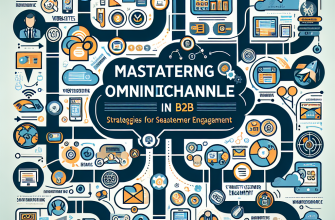Exploring the Distinctive Paths: Omnichannel vs. Integrated Marketing Strategies
In the ever-evolving landscape of digital marketing, two strategies often discussed are omnichannel and integrated marketing. Both approaches aim to create a cohesive user experience and improve customer engagement, yet they diverge in execution and philosophy. Understanding the nuances between them is crucial for marketers aiming to craft compelling, customer-centric campaigns.
The Essence of Omnichannel Marketing
Omnichannel marketing is about creating a seamless customer experience across all channels and platforms. This strategy acknowledges that customers interact with a brand in various ways – through social media, email, mobile apps, websites, and physical stores. The goal is to provide a consistent brand message and shopping experience, no matter how or where a customer engages with the brand.
The omnichannel approach focuses on the customer’s journey, ensuring that it is fluid and uninterrupted. For instance, a customer might see a product on a brand’s Instagram account, click on it, and be taken to the product page on the website. If they choose not to purchase at that moment, the brand can send a targeted email reminding them of the product, or it might appear as a targeted ad on a different website they visit later. The key is that the customer’s experience feels personalized and cohesive, not disjointed or repetitive.
The Integrated Marketing Strategy
Integrated marketing, on the other hand, emphasizes the integration of all marketing communications to ensure consistency across all channels and messages. It’s about aligning marketing tactics – advertising, sales promotion, public relations, direct marketing, and social media – to communicate a unified message. This approach is more about the harmony of message than the seamless experience of the customer journey.
An integrated marketing strategy might involve a new product launch, where the brand uses television ads, social media posts, email marketing, and in-store promotions to spread the same message. Each channel works together to reinforce the campaign’s message, amplifying the brand’s reach and impact.
The Key Differences
The primary difference between omnichannel and integrated marketing strategies lies in their focus and execution. Omnichannel marketing centers on creating a unified customer experience across all platforms, while integrated marketing focuses on delivering a consistent message across different marketing channels. Omnichannel is about the customer’s interaction with the brand, ensuring it is consistent and personalized. Integrated marketing is about the consistency of the brand’s message, ensuring it is coherent and unified across all channels.
Another distinction is in their approach to channels. Omnichannel marketing requires brands to be present on all channels that their customers are using, creating a web of interconnected touchpoints. Integrated marketing, while also utilizing multiple channels, does not necessarily require a presence on every possible platform. Instead, it selects the most effective channels for its message and ensures that all messaging is consistent across these chosen platforms.
Implementing the Strategies
Implementing an omnichannel strategy requires a deep understanding of your customers’ behaviors and preferences. It involves collecting and analyzing data from various touchpoints to create personalized and relevant experiences. Technology plays a crucial role in this strategy, as advanced systems are needed to track customer interactions and unify their experiences across channels.
On the other hand, an integrated marketing strategy requires strong coordination between different departments and channels. The focus is on crafting a singular, compelling message and ensuring that it is communicated effectively across all selected channels. This strategy often involves meticulous planning and a centralized marketing approach to maintain consistency.
Which Strategy to Choose?
The choice between omnichannel and integrated marketing strategies depends on your business goals, resources, and customer base. Omnichannel marketing is particularly effective for businesses that have a diverse customer base interacting with the brand across multiple platforms. It’s suited for companies focused on enhancing customer experience and building long-term customer relationships.
Integrated marketing, however, is ideal for businesses aiming to strengthen their brand message and ensure consistency in their communications. It’s a great approach for launching new products or rebranding efforts, where the coherence of the message is paramount.
Navigating the Paths
In reality, the lines between omnichannel and integrated marketing strategies can blur, and many businesses find value in combining elements of both. The integration of consistent messaging (a core principle of integrated marketing) with a seamless customer experience (the hallmark of omnichannel marketing) can be a powerful approach.
The digital marketing landscape is dynamic, and what works today may evolve tomorrow. Keeping the customer at the center of your strategy, whether you lean towards omnichannel, integrated marketing, or a hybrid, is key. By understanding the strengths and applications of each approach, marketers can craft strategies that not only resonate with their audience but also drive meaningful engagement and growth for their brand.

A seasoned digital marketing strategist with over 8 years of experience across various areas of digital marketing, including SEO, SMM, PPC, content marketing, and email marketing. Specializes in transforming B2B, B2C, e-commerce, and SaaS businesses by creating effective go-to-market strategies and building thriving digital ecosystems. Known for a data-driven approach to optimizing campaigns and maximizing results.
“If your business is looking to scale or in need of a fresh perspective, feel free to contact”.





